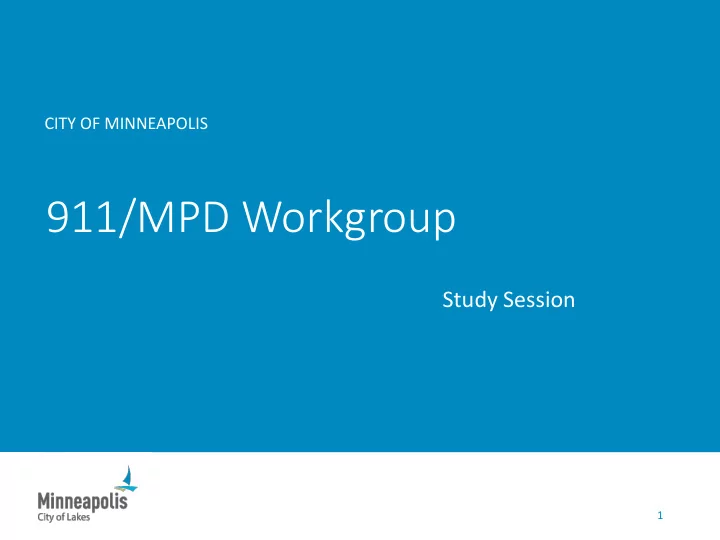

CITY OF MINNEAPOLIS 911/MPD Workgroup Study Session 1
Agenda • Background and introduction (10 minutes) • MN Statutes (10 minutes) • Review of the data (65 minutes) • Follow up and next steps (5 minutes) 2
Study session purpose • In-depth discussion of 911 call and MPD response data to ground everyone in the same information the workgroup used to formulate recommendations • Gather additional questions for analysis prior to the final presentation of recommendations 3
Staff direction Directing the City Coordinator’s Office to convene a workgroup comprised of internal City staff as well as community members to analyze dispatch call categories and determine whether there are opportunities to expand the City’s ability to respond to those calls beyond the Minneapolis Police Department. This review shall include, without limitation: • Whether there are financial, time, and/or personnel efficiencies to be gained in responding to those calls by individuals other than Minneapolis police officers. • What types of de-escalation training mechanisms are in place or could be in place in responding to calls for emergency assistance, and whether responding to certain calls by non-police personnel will decrease likelihood of escalation. • What the stakeholder and resident experience is for those on the receiving end of emergency call interventions, whether by police officers or non-police personnel. • Whether certain calls must, by state law or other legal requirements, be responded to by POST Board- certified law enforcement officers. • Whether a new alternative emergency number for more specialized triage related but not limited to mental health crises, domestic violence, and substance abuse could improve outcomes. • What resources, if any, would be required if any portion of the calls currently dispatched to the Police Department were diverted elsewhere, including the cost of hardware and software required to integrate dispatch functionality into other departments. The work group should be comprised of a representative from the Minneapolis Police Department, 911, Minneapolis Fire Department, Office of Violence Prevention, and the City Attorney’s Office. The workgroup shall be supported by other departments as needed. Additionally, the workgroup shall include six (6) community members to be appointed half by the City Council and half by the Mayor through the open appointment process. Staff is directed to report back to the PSEM Committee with recommendations, including training needs and opportunities, timelines for piloting or prototyping alternative dispatch responses, and financial and personnel costs associated with any forthcoming recommendations by no later than May 9th, 2019. 4
Workgroup structure Meeting One: Data Formulated and submitted ideas based on the explicit purpose of the workgroup and data. 50+ ideas submitted. Meeting Two: Idea ranking Vet the ideas for risk, financial, time, and/or personnel implications for the City. Meeting Three: Vetting Further vetting of alternatives and to finalize recommendations; provide Meeting Four: suggestions for how to handle ideas that were not vetted this Fall. Finalization 5
Licensed Peace Officers & Minnesota State Statutes Domestic Violence Minn. Stat. 629.342 – each police department must develop a protocol regarding domestic violence cases. Minn. Stat. 629.341 – an officer who finds probable cause that a domestic abuse crime has occurred must do a police report. Other Statutes Minn. Stat. 626.84 (c) "Peace officer" means: (1) an employee or an elected or appointed official of a political subdivision or law enforcement agency who is licensed by the board, charged with the prevention and detection of crime and the enforcement of the general criminal laws of the state and who has the full power of arrest , . . . ; Subd. 2. Scope. Notwithstanding sections 12.03, subdivision 4, 12.25, or any other law to the contrary, no individual employed or acting as an agent of any political subdivision shall be authorized to carry a firearm when on duty unless the individual has been licensed under sections 626.84 to 626.863. Minn. Stat. 626.862 POWERS OF LAW ENFORCEMENT OFFICERS. Except as specifically provided by statute, only a peace officer and part-time peace officer may: (1) issue a citation in lieu of arrest or continued detention unless specifically authorized by ordinance; (2) ask a person receiving a citation to give a written promise to appear in court; or (3) take a person into custody as permitted by section 629.34. Minn. Stat. 169.98 POLICE, PATROL, OR SECURITY GUARD VEHICLE. § Subd. 1a.Vehicle stop authority. Only a person who is licensed as a peace officer or part-time peace officer under sections 626.84 to 626.863 may use a motor vehicle governed by subdivision 1 to stop a vehicle as defined in section 169.011, subdivision 92. Subd. 1b.Operation of marked vehicle. Except as otherwise permitted under sections 221.221 and 299D.06, a motor vehicle governed by subdivision 1 may only be operated by a person licensed as a peace officer or part-time peace officer under sections 626.84 to 626.863. 6
911/MPD Data 7
8
9
10
11
12
13
14
15
16
17
18
19
20
21
22
23
Next steps • Workgroup meeting four: November 8 th • Final PSEM presentation: November 13 th 24
Recommend
More recommend